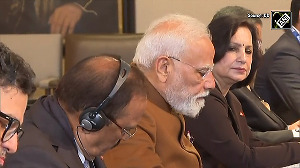Cameroon's Marc-Vivien Foe became one of the few players to die during or soon after a match when he collapsed with a suspected heart attack after 72 minutes of the Confederations Cup semi-final against Colombia on Thursday.
Playing in stifling heat in Lyon, the 28-year-old fell to the ground unchallenged in the centre circle. Despite the immediate attention of medical staff, he was pronounced dead 45 minutes later.
Trevor Brooking, a director at West Ham United, one of Foe's former clubs, said: "When you consider the rigorous medical checks players have to go through on a regular basis in the modern game, it's hard to understand how such a thing could happen."
Foe's death is similar to that of 24-year-old Nigerian international Samuel Okwaraji who collapsed 10 minutes from the end of a World Cup qualifier against Angola in Lagos in August 1989, and died from cardiac failure.
An autopsy found he had an enlarged heart and high blood pressure.
Most of the deaths of seemingly healthy players at matches have been either due to heart problems or lightning strikes.
HEART ATTACK
Last October 28-year-old Brazilian striker Marcio Dos Santos died of a heart attack just hours after scoring a goal for Peruvian side Deportivo Wanka.
The only player in Britain to have died on the pitch during a professional match in the last 50 years was 25-year-old York City striker Dave Longhurst who collapsed in a league match against Lincoln City in September 1990.
An inquest revealed he had suffered from a rare heart condition.
Porto player Fernando Pascoal das Neves, known as "Pavao", collapsed and died during a league match in December 1973 -- in the 13th minute of the 13th game of the season.
French international midfielder Emmanuel Petit's 20-year-old brother Oliver died during a match in 1987.
Since 1963, there have been a surprisingly high number of unexplained deaths among Romanian players. Constantin Tabarcea, who was 26 and played for Petrolul Ploiesti, died after collapsing during a first division match in 1963.
In 15 months between 1999 and 2001, four Romanian players died after collapsing. Astra Ploiesti's Stefan Vrabioru died on the way to hospital after a fall just minutes after being brought on for his first division debut against Rapid Bucharest.
LIGHTNING STRIKES
Lightning can pose serious risks on the exposed pitches used for amateur football and can even strike with deadly results at the grounds of professional clubs.
In February 1967 one player died and four others were seriously injured when lightning struck during an English amateur Cup quarter-final between Highgate United and Enfield.
Goalkeeper Erik Jongbloed of DWS in the Netherlands was killed by lightning during a match in September 1984 -- in front of his father, the former national team goalie Jan Jongbloed.
In August 2001, two players were killed and 10 others severely burned when a bolt of lightning struck a stadium during a professional match in Chiquimulilla, in Guatemala.
A bolt of lightning crashed into a metal guard rail, creating a ring of electric charge on the field, burning players, coaches and referees.
Last October Colombian striker Geovanny Cordoba and former international player Hermann Gaviria died after being struck during a training session. One player was struck by lightning and died after a match in Ukraine last July.
Deaths from injuries suffered on the pitch are extremely rare - there is a record of only one in the professional game in more than 70 years.
In September 1931 in Glasgow, John Thompson, 23, the Celtic and Scotland goalkeeper, dived at the feet of Rangers forward Sam English and suffered a fractured skull. He died later in hospital without regaining consciousness.
One of the most infamous soccer deaths of recent years did not happen on the pitch -- but Andres Escobar of Colombia was murdered as a direct result of what happened on it.
He scored an own goal when Colombia lost 2-1 to the United States in the 1994 World Cup finals and was murdered soon after returning home to Colombia by a hitman.
A gambling syndicate was angry at losing money on the result of the match and took its revenge.







